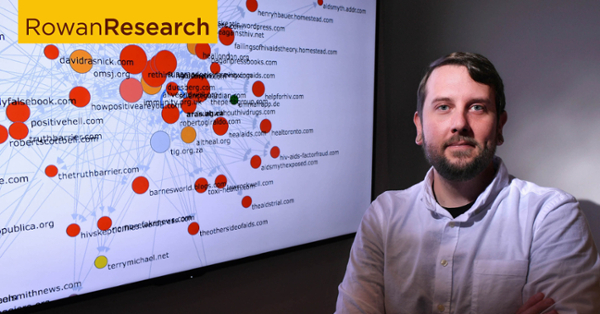Investigating science deniers online
Investigating science deniers online

Captured in a screenshot, his work is analogous to the internet itself – a seemingly endless array of connections, many to and from science deniers.
Miles Coleman, Ph.D., an assistant professor of Communication Studies in the Ric Edelman College of Communication, Humanities & Social Sciences, researches the online communication of science deniers, conspiracy peddlers who reject established medical standards like the efficacy of COVID-19 vaccinations and the origins of AIDS.
Miles Coleman, Ph.D.
Science communicator
Areas of expertise: Rhetoric of science, technology and medicine; communication ethics; digital mediaMore information
Coleman uses special online search tools called bots to dive deep into the underbelly of the web where science deniers dwell, a digital petri dish of sorts where those who would spread misinformation have a medium to thrive.
“The internet forms these enclaves for people to believe whatever they want,” he said. “My research builds out literacies to help people to know and live well by countering the tactics used by science deniers to entice people into their belief bubbles.”
Coleman said in the case of vaccine deniers, there’s no single reason why many people refuse to take a proven, potentially lifesaving injection, and who work feverishly online to convince others to reject it too.
“There’s an array of reasons,” he said. “Some people think vaccines are part of some big government conspiracy, while others just don’t think there’s a good reason to get them. So, a one size-fits-all approach to counter-messaging is unproductive.”
Coleman’s research follows the seemingly contradictive patterns of science denialist messages online, such as the rejection of proven treatments for unproven ones (like ingesting bleach) in the name of “safety.” The idea is that, if researchers learn the beliefs and modes of communication used by science deniers, they can use that knowledge to make more effective counter-messaging.
Though misinformation spread online can be dangerous, Coleman noted that while the topics and mediums seem new, science denialism has existed since well before the internet. It is, however, a problem intensified by web features and the ease with which people can share misinformation.
“The web can be an amazing place, but it can also be ugly and dangerous,” he said. “I want to help people flourish, despite phenomena like science denialism.”
Rowan University researchers are passionate about what they do. Find more at Meet Our Researchers.